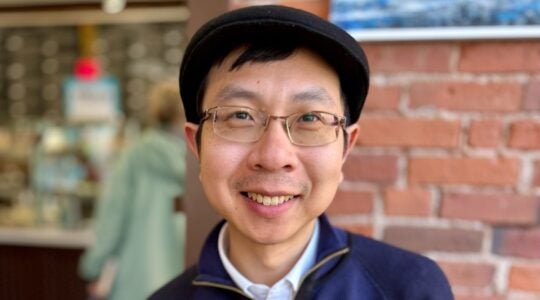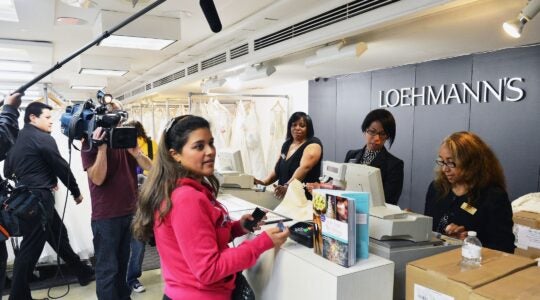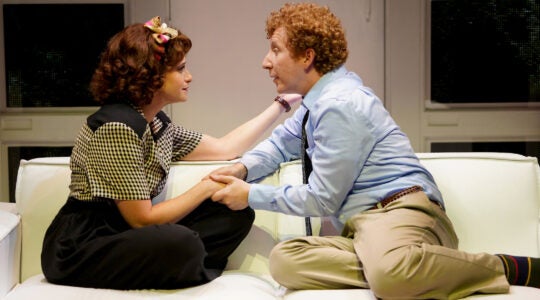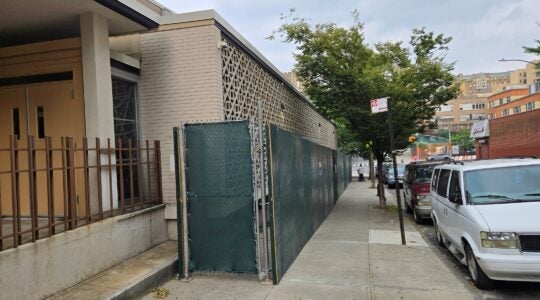The Jewish Community Center of West Hempstead is a Conservative synagogue located on tree-lined Dogwood Avenue in southwest Nassau County. Even the street’s name suggests a kind of leafy suburban bliss.
But as Modern Orthodox Jews flock to the area, Dogwood Avenue has become a Berlin Wall of sorts for this, the community’s lone non-Orthodox congregation.
The reason? Dogwood is the dividing line between West Hempstead on the east and Franklin Square on the west, and synagogue leaders say local real estate agents don’t show prospective Jewish homebuyers houses in Franklin Square.
“They have been steering Jews to the West Hempstead side of Dogwood Avenue, saying, ‘This is where the Jews are,’” said Richard Selzer, the shul’s president.
Rabbi Arthur Vernon said that in the seven years he has been the congregation’s spiritual leader he does not know of “one home in Franklin Square [that] has been sold to Jewish buyers. I’m curious as to why Jews are not shown homes there.”
Local real estate agents insist that they show buyers homes in the areas in which they want to live and that their Jewish customers prefer to live with other Jews; Franklin Square is becoming an increasingly Italian area.
Consequently, the Conservative congregation’s catchment area has effectively been cut in half at the same time the area is fast attracting the Modern Orthodox. The West Hempstead area is the second largest Orthodox community on Long Island, behind the Five Towns. The combination of brokers not selling Jews homes in Franklin Square, while West Hempstead becomes increasingly Orthodox, has made growing his congregation extremely difficult, Rabbi Vernon acknowledged.
“Historically half of our congregation has lived in West Hempstead and half in Franklin Square,” the rabbi observed. “But as Jewish folks in Franklin Square have sold their homes, non-Jews have been buying them. …
“The homes in the two blocks behind our shul used to be owned by our members. Now, there are only about 10 there who are not Orthodox.”
As a result, the Conservative shul’s membership has plunged from 650 families in the 1960s to 200 member units, with the median age in the mid- to late 60s — including more than 20 nonagenarian members. Rabbi Vernon said that he has no illusions of trying to attract the area’s young Jewish families, most of which belong to the community’s five Orthodox congregations.
The changing demographics along Nassau County’s South Shore has had a profound impact on the other Conservative synagogues as well. Many now hold services and activities only on weekends.
Until the late 1940s, the major synagogue in the area was Conservative — Congregation Beth Israel in Hempstead, which is celebrating its 96th birthday this year. It had a large building that was sold in 1978 when the congregation’s membership shrunk; it now has about 120 members and a full-time rabbi, according to Lynn Sevan, a vice president.
She said the synagogue has an older membership — it has no Hebrew school — and that it primarily conducts religious services and events on the weekends.
The Malverne Jewish Center, about a mile away from the JCC, sold its building last October to the Bridge Church of Nazarene, a Protestant church, and continues to operate in three rooms in the basement.
Audrey Schneider said she and her husband were members of Malverne for nearly 50 years but switched in November to the JCC.
“At least five others came with us and others will be coming,” she said. “There are only about 15 or 20 diehards left. This was a congregation of 400 at one time. They’re paying $1 a year for use of the basement.”
About two miles away, the Franklin Square Jewish Center has its 12,500-square-foot, 60-year-old building on the market for $3.5 million. Howard and Toni Soren said they had been members there for 40 years before joining the Jewish Community Center 10 years ago.
“When we left, there were about 80 to 100 members,” said Howard Soren. “Now they are down to about 30 members.”
Rabbi Vernon pointed out that his is “one of the few Conservative synagogues on the South Shore that still has a daily minyan. When any of the members of other Conservative shuls have a yahrtzeit and want to say Kaddish, we see them here.”
He said he also sees some of them at the programs the synagogue runs each day, including eight or nine “havurah” programs in which congregants meet to discuss a particular subject such as the Bible, dance and films. The JCC also hosts two or three public lectures a year.
Schneider noted that she is bringing with her the “gala music concert” she had staged for 30 years at the Malverne Jewish Center.
n
Lacking a pool of families with bar and bat mitzvah-age children, Rabbi Vernon is trying an approach that Sevan said Congregation Beth Israel in Hempstead is also using: reaching out to mature adult Jews.
“These are people who used to belong to a synagogue and don’t anymore,” he said. “There are many of them,” he added, citing a demographic study by UJA-Federation of New York.
Last year, his congregation attracted seven new member units — all of them single individuals.
Fran Levy, who joined the JCC about 18 months ago after seeing an ad for the rabbi’s “Judaism 101” class, pointed out that the congregation’s sisterhood runs a “mini university” twice a year, each of which consists of a half-dozen classes that are open to the community. The last mini university attracted 80 women, including many from the Young Israel of West Hempstead.
Levy said those classes have sparked her interest in her Jewish heritage, which she said she had not paid much attention to until she spotted Rabbi Vernon’s ad.
“It’s enriched my life,” said Levy, who is divorced and turns 66 in August.
The JCC’s budget is not completely dependent on membership revenues; it has income from a day care program that rents its second-floor classrooms and from its catering hall — the only glatt kosher facility in West Hempstead. Rabbi Efrem Schwalb of Congregation Eitz Chaim of Dogwood Park supervises it, and Jews from various Orthodox synagogues use it.
In contrast to the tensions between Orthodox Jews and non-Orthodox Jews sometimes on display in the Five Towns, Rabbi Vernon said he gets along very well with Eitz Chaim of Dogwood Park, which is Orthodox and on the next block. In fact, he said, not only does Eitz Chaim’s rabbi serve as mashgiach at the JCC’s catering hall, but Rabbi Vernon delivers a dvar Torah at the Orthodox congregation each year.
n
In addition to reaching out to mature adults, Rabbi Vernon said he hopes to add new members in the next five years through a consolidation with the Malverne and Franklin Square congregations, as well as other shuls in the area that are struggling. But it is the real estate brokers he and Selzer, his president, are so upset about.
“When I bought my house in 1982, I was shown four houses in West Hempstead before I was shown two in Franklin Square,” Selzer, 60, recalled, adding that he bought one in Franklin Square and that his children attended the Franklin Square public schools.
Rabbi Vernon said he can’t understand why brokers are not selling Jews homes in Franklin Square, but he stressed that he does not believe they are motivated by “discrimination against Conservative” Jews.
Sully Diamond, president of Congregation Eitz Chaim of Dogwood Park, said he too is upset that Jews are not buying homes in Franklin Square.
“It would be a big help for Eitz Chaim if they would bring them to this area,” he said. “I live in Franklin Square, one block in [from Dogwood] on the Franklin Square side.”
Ira Litkofksy, a lifelong member of the JCC, pointed out that the area’s four-square-mile eruv was extended into Franklin Square in 1996 to make the community accessible to Orthodox Jews. An eruv is a boundary within which observant Jews are permitted to carry on the Sabbath and Jewish holy days.
Litkofsky noted also that another Orthodox congregation in West Hempstead, Zichron Kadoshim, is also on Dogwood Avenue, less than a half-mile north of Congregation Eitz Chaim.
“So there are three synagogues in West Hempstead that are literally on the Franklin Square border,” Litkofsky said.
David Zivotofsky of Ark Realty, which has served West Hempstead since 1950, said that although “we concentrate in West Hempstead, no one is steering anybody.”
“If someone wanted to be a member of the JCC or Eitz Chaim, obviously I would show him Franklin Square,” he said. “I do have people who request Eitz Chaim. Homes on either side of Dogwood Avenue are in close walking distance, but not a lot of people are moving there. People want to move where other [Jewish] people are already.”
Sharona Beck, the owner of a West Hempstead realty business that bears her name, insisted that she tells her “customers all the houses [for sale], including those in Franklin Square, and they tell me where they want to live. A lot of customers you can push and push and show them homes in Franklin Square, but a lot want to be where their friends are.”
Beck said she wishes the buying area for Jews “would expand” into Franklin Square.
“It’s a beautiful area,” she said. “It’s not that we don’t want customers to go there. That would be great, because it would open a new area. … It’s a lovely area and I wish it would grow; it would be better for everyone.”
Beck added that she recently told some congregants at Eitz Chaim that she had a home for rent in Franklin Square but that there has been no interest.
The New York Jewish Week brings you the stories behind the headlines, keeping you connected to Jewish life in New York. Help sustain the reporting you trust by donating today.




